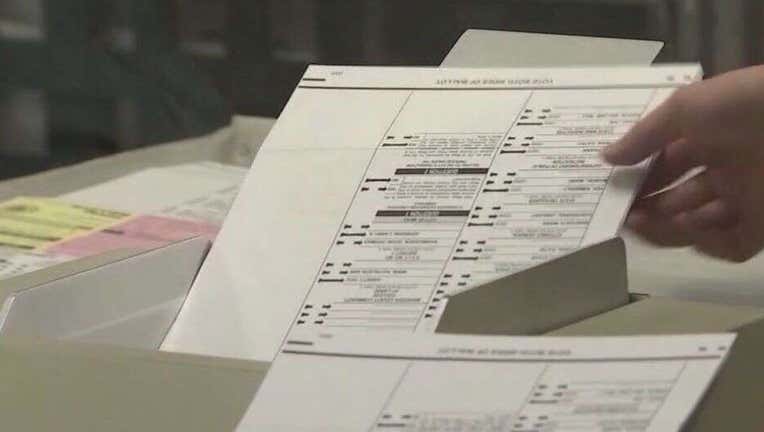Court mulls appeal over fixing unsigned ballots in Arizona

Voting ballot in Maricopa County (file)
PHOENIX - Lawyers arguing over whether Arizona voters who didn’t sign their early ballots should get up to five days after the election to fix the problem were peppered with questions by an appeals court about the other types of situations in which the state lets people correct ballot flaws.
One judge also questioned whether those who turn in ballots without signatures might just have to live with those mistakes.
The 9th Circuit Court of Appeals in San Francisco heard arguments on July 7 in an appeal of a ruling in September that concluded Arizona’s election-day deadline for "curing" missing signatures unjustifiably burdened the right to vote. Even with the ruling, there were no cure periods for missing signatures after Election Day during the 2020 primary and general elections.
The Democratic groups that filed the lawsuit pointed out that state election rules allow county recorders five days after the election for voters whose signatures don’t match those on file to come to the office and show they actually signed the ballot. The same goes for people who arrive at the polls to vote in-person but lack required identification.
Republican Attorney General Mark Brnovich’s office appealed the ruling, arguing a state law requires absentee ballots to be returned with a signature by close of polls on Election Day. State and national Republican groups joined in arguing against giving extra time to fix unsigned ballots.
Democratic Secretary of State Katie Hobbs, Arizona’s chief election officer, wanted the extra five days included in the state’s latest election procedures manual, but Brnovich refused to sign off on the provision, so Hobbs removed it.
Voting rights activists to protest voter suppression at Arizona AG's office
Voting rights activists are heading to Arizona Attorney General Mark Brnovich's office on July 8 to protest voter suppression and to demand federal action to protect voting rights. The protest comes after the Supreme Court upheld an Arizona law that bars so-called ballot harvesting.
Judge Atsushi Wallace Tashima asked Drew Ensign, an attorney with Brnovich’s office, whether it was reasonable, when confronting the issue of unsigned ballots, to consider how Arizona deals with other balloting flaws.
Ensign said it’s reasonable to treat voters whose signatures don’t match those on file differently than those who simply didn’t sign their ballots. Mismatched signatures are typically not the voters’ fault, whereas those who don’t sign their ballots are to blame, Ensign said.
"The state is spending resources to prevent people’s voters from being disqualified through no fault of their own is an entirely reasonable thing to do," Ensign said.
Daniel Shapiro, an attorney representing the GOP groups, said unsigned ballots carry a high risk of fraud and pose additional administrative burdens on voting officials as they face deadlines for completing vote counting.
"Signing an unsigned ballot after election day is in effect voting after election day — and there is no right to do that. And preventing that does not impose any burden on the plaintiffs," Shapiro told the appeals court.
Under questioning by Judge Susan Graber, Elisabeth Frost, an attorney representing the Democratic groups that filed the lawsuit, acknowledged the groups aren’t claiming that the deadline imposes a disadvantage on a protected class of people.
Graber pointed out the problems being examined in the lawsuit were because of mistakes made by voters who didn’t sign their ballot envelopes and noted that there’s no way for voters who regret their selection in a given political race to undo their vote a week after the election.
"How does that factor play into the reasonableness of saying, ‘If it’s your mistake, at some point you have to live with it’ — and that point may be the end of the voting period?" Graber asked.
Frost drew parallels between voters who didn’t sign ballots and those who showed up at the polls without IDs. Those who forgot their IDs are given five days to fix their problems, Frost said.
"Arizona has never explained why it justifies treating this group of voters — who to the extent they made a mistaken, arguably made the same mistake that the voter ID voters made — from curing their ballot," Frost said.
Related stories
- Records show pressure by Fmr. Pres. Trump, allies on Arizona officials
- SCOTUS upholds Arizona voting rules, halts California charity donor disclosure
- SCOTUS ruling on Arizona voting laws causes concerns among voting rights advocates
- Tribes say voting access hurt by US Supreme Court ruling over Arizona election regulations
- Arizona Legislature set to send initiative changes to ballot
Tune in to FOX 10 Phoenix for the latest news:
Get breaking news alerts in the FREE FOX 10 News app. Download for Apple iOS or Android.

